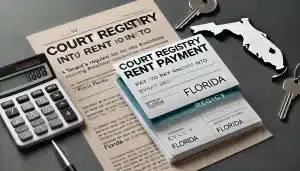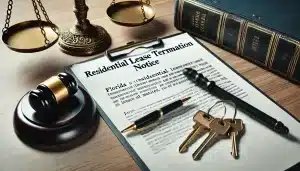Table of Contents
Residential Eviction for Nonpayment in Florida: Tenant’s Obligation to Deposit Rent into Court Registry
Introduction
Residential eviction for nonpayment of rent is the most common eviction scenario landlords face in Florida. To efficiently navigate this process, landlords and tenants alike must understand specific legal obligations, notably the tenant’s duty to deposit disputed rent into the court registry. Failure to adhere to this obligation can drastically affect the outcome of an eviction case.
This brief article clarifies Florida Statute §83.60(2) — the critical requirement for tenants — and provides concise guidance on compliance for both landlords and tenants.
Tenant’s Obligation Under Florida Statute §83.60(2)
In Florida eviction proceedings, tenants raising defenses other than the payment of rent are legally obligated to deposit the disputed rent amount into the court registry. This statutory obligation is explicitly designed to ensure fairness, protecting both landlords financially and tenants legally while litigation is pending.
Specifically, Florida Statute §83.60(2) mandates that the tenant must deposit the full amount of disputed rent with the court registry within five business days of receiving the eviction summons. Additionally, tenants must continue depositing ongoing rent payments as they become due throughout the litigation.
Failure to comply results in severe consequences, notably:
- Automatic waiver of all eviction defenses other than payment.
- Landlords becoming eligible to swiftly obtain a default judgment.
For a deeper look into Florida eviction statutes, timelines, and additional procedures, visit our detailed guide on the Florida Eviction Process.
Procedure for Depositing Rent into the Court Registry
Upon being served with an eviction summons, tenants must promptly act to secure their legal protections by depositing the disputed rent into the court registry. Follow these critical steps:
- Calculate and Deposit Rent Promptly
Deposits must reflect the full amount claimed by the landlord or an amount determined by the court. Delays in this deposit jeopardize the tenant’s legal defense. - File a Motion if Rent Amount is Disputed
If tenants disagree with the rent amount stated, filing a “Motion to Determine Rent” is essential within the five-day window. The court will then schedule a hearing to resolve the dispute over the correct rental amount. - Provide Supporting Documentation
When filing this motion, tenants must present clear documentation supporting their rent calculations. Acceptable documentation includes receipts, canceled checks, or bank transaction records.
Consequences for Tenants Failing to Comply
Compliance with court-registry requirements is critical. Tenants who fail to deposit rent or submit the required motion within the specified timeframe lose their right to present any defense against eviction except payment itself.
In such cases, the landlord can immediately seek a default judgment for eviction, often obtaining possession rapidly and without further hearings. Thus, tenants must act swiftly and carefully.
Best Practices for Florida Landlords
To enhance your chances of successfully navigating eviction for nonpayment, adopt these best practices:
- Detailed Record-Keeping: Maintain thorough documentation of rental agreements, payment history, eviction notices, and communications.
- Strict Compliance with Florida Statutes: Adhere precisely to notice requirements and procedural timelines. Even minor mistakes can delay or invalidate eviction proceedings.
- Clear Communication: Transparent, professional, and timely tenant communications often prevent conflicts from escalating into court disputes.
- Engage Legal Counsel: Obtain qualified legal advice early to streamline the eviction process. Contact attorney John M. Jorgensen for expert guidance in eviction cases within Palm Beach County.
Best Practices for Florida Tenants Facing Eviction
Tenants can protect their rights by following these strategic best practices:
- Fully Understand Your Lease Terms: Clearly understand lease terms regarding rent obligations, late payments, and eviction policies.
- Act Immediately Upon Notice: Address notices proactively by paying rent, negotiating with your landlord, or seeking immediate legal assistance.
- Maintain Clear Documentation: Keep organized records of all communications, rent payments, maintenance requests, and notices.
- Seek Experienced Legal Assistance: Consult attorney John M. Jorgensen to ensure your rights are thoroughly protected during eviction proceedings.
Frequently Asked Questions (FAQs)
Can landlords evict without a court order in Florida?
No, Florida prohibits self-help eviction practices, such as changing locks or cutting utilities. Landlords must follow the court process.
Does depositing rent stop an eviction automatically?
Depositing rent into the registry preserves tenants’ right to defend the eviction but does not automatically halt the eviction; a court decision ultimately decides the outcome.
How quickly can eviction happen in Florida?
Typically, the eviction process takes around 3–6 weeks. However, it can proceed faster if tenants fail to comply with court registry requirements.
Protect Your Interests with Expert Legal Advice
Eviction proceedings for nonpayment are time-sensitive and legally complex. For comprehensive guidance tailored to your specific situation, contact experienced eviction attorney John M. Jorgensen of Scott, Harris, Bryan, Barra & Jorgensen, P.A.
To protect your rights and ensure compliance with Florida’s residential eviction statutes, contact our Palm Beach Gardens office today. Schedule your personalized consultation by calling (561) 624-3900 or completing our online contact form.












